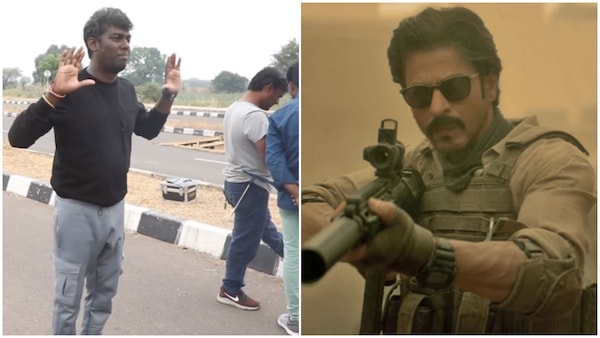Jawan director Atlee defends use of violence in movies, calls it a cure for societal issues
Jawan director Atlee noted that he uses violence to distinguish between heroes and villains, to create a certain shock value, and as a tool to highlight societal issues.

Atlee on the sets of Jawan.
Last Updated: 10.32 AM, Feb 25, 2024
Filmmaker Atlee has defended the use of violence in his movies, citing its potential to bring about positive change and emphasizing the impact of visually representing tragic events.
Atlee expressed his belief in the power of cinema to convey realities that might be overlooked in other forms of media. Drawing parallels with news channels showcasing violent footage, Atlee justified his choice to depict sensitive subjects, stating, "Why does a news channel carry violent footage? To show the world the truth."
Atlee explains the purpose behind violent scenes
He elaborated on the significance of visually portraying societal issues, using the example of farmers' suicides featured in his recent film Jawan, starring Bollywood superstar Shah Rukh Khan . "I am also a media person. I am also a part of you. I have a voice. When I visually show how a farmer's suicide is happening, and it gets stuck in your heart and brings about some change, I am using my voice," Atlee explained during the conversation with ABP News.
The filmmaker likened violence in his movies to a medical intervention, stating, "So sometimes, violence is like a doctor’s injection. It is for a better cure; you can’t treat all ailments with tablets. That’s the reason we have violence. It is not to provoke anyone."
Violence is a key narrative tool
Atlee also noted that he uses violence to distinguish between heroes and villains, to create a certain shock value, and as a tool to highlight societal issues. "For example, in my films, if a dog is being shot, a person who attacks animals is a criminal and a villain," he said.
ALSO READ: My next film could be with Shah Rukh Khan and Thalapathy Vijay, reveals Jawan director Atlee
Atlee is known for the liberal use of blood and various types of violence to drive home a tragedy in his movies. The accident scene in Raja Rani, where Nazriya Nazim's Keerthana dies, illustrating the loss of human lives due to medical malpractice in Mersal, and showcasing farmers' suicides in Jawan, Atlee consistently harnesses the profound impact of visuals to evoke strong responses from audiences.

 Premium
Premium